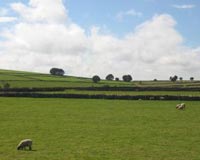 More than a quarter of a million houses now have planning permission to be built on the green belt, according to research from the Campaign to Protect Rural England.
More than a quarter of a million houses now have planning permission to be built on the green belt, according to research from the Campaign to Protect Rural England.
It said this was an increase of 50,000 on the year to March 2015, and nearly 200,000 more than in March 2012.
Compiled from draft and adopted local plans, the Green belt under siege report said green belt boundaries are being changed to accommodate housing at the fastest rate for two decades.
“We need stronger protection for the green belt, not just supportive words and empty promises,” said Paul Miner, planning campaign manager at the CPRE.
“To build the affordable homes young people and families need, the government should empower councils to prioritise the use of brownfield sites. Brownfield land is a self-renewing resource that can provide at least 1m new homes.”
In the year to 2015, 11 local authorities finalised boundary changes to accommodate development. The 275,000 houses now planned are an increase of 25% on 2015, and almost double the 147,000 houses outlined for green belt in Labour’s 2009 regional plans, with particular pressure on the Metropolitan and West Midlands green belt.
Green belt designation was formally introduced in 1955 to prevent urban sprawl.
| Regions and counties | Number of houses planned on green belt (March 2016) | % increase on number of houses planned in March 2015 |
|---|---|---|
| Cambridgeshire | 2,385 | 27% |
| Metropolitan (around London) | 117,208 | 35% |
| Oxfordshire | 3,510 | -22% |
| North East | 11,550 | 44% |
| North West | 19,024 | 61% |
| Nottinghamshire | 13,800 | 0% |
| South West | 16,245 | 0% |
| West Midlands | 44,170 | 22% |
| Yorkshire | 46,900 | 15% |
| Total | 274,792 | 25% |
• To send feedback, email alex.peace@estatesgazette.com or tweet @EGAlexPeace or @estatesgazette










